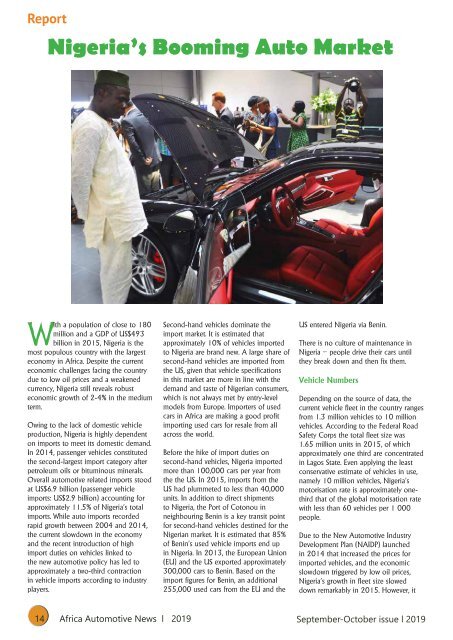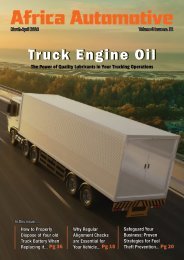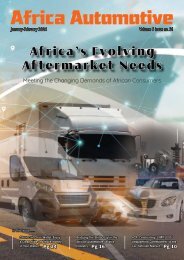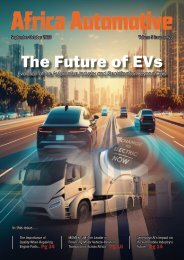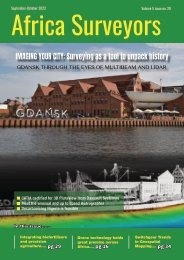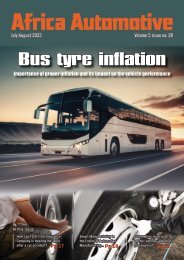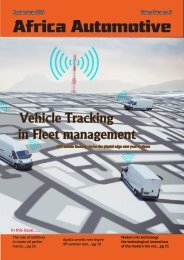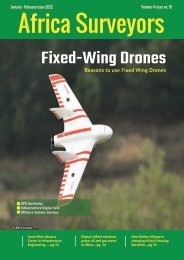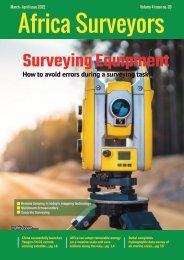Africa Automotive News September-October digital issue 2019
Africa Automotive prides itself to be the ONLY Africa’s leading and MOST authoritative magazine for the automotive industry in Africa with printed copies for the automotive industry decision makers in both government, NGO’s and private sector. The Bi-monthly magazine offers cost effective advertising services that get results and improves growth in the auto B2C and B2B sector, keeping an eye on latest technologies in Africa and across the world, the magazine predominately covers the developments in the Africa auto industry.
Africa Automotive prides itself to be the ONLY Africa’s leading and MOST authoritative magazine for the automotive industry in Africa with printed copies for the automotive industry decision makers in both government, NGO’s and private sector. The Bi-monthly magazine offers cost effective advertising services that get results and improves growth in the auto B2C and B2B sector, keeping an eye on latest technologies in Africa and across the world, the magazine predominately covers the developments in the Africa auto industry.
Create successful ePaper yourself
Turn your PDF publications into a flip-book with our unique Google optimized e-Paper software.
Report<br />
Nigeria’s Booming Auto Market<br />
With a population of close to 180<br />
million and a GDP of US$493<br />
billion in 2015, Nigeria is the<br />
most populous country with the largest<br />
economy in <strong>Africa</strong>. Despite the current<br />
economic challenges facing the country<br />
due to low oil prices and a weakened<br />
currency, Nigeria still reveals robust<br />
economic growth of 2-4% in the medium<br />
term.<br />
Owing to the lack of domestic vehicle<br />
production, Nigeria is highly dependent<br />
on imports to meet its domestic demand.<br />
In 2014, passenger vehicles constituted<br />
the second-largest import category after<br />
petroleum oils or bituminous minerals.<br />
Overall automotive related imports stood<br />
at US$6.9 billion (passenger vehicle<br />
imports: US$2.9 billion) accounting for<br />
approximately 11.5% of Nigeria’s total<br />
imports. While auto imports recorded<br />
rapid growth between 2004 and 2014,<br />
the current slowdown in the economy<br />
and the recent introduction of high<br />
import duties on vehicles linked to<br />
the new automotive policy has led to<br />
approximately a two-third contraction<br />
in vehicle imports according to industry<br />
players.<br />
Second-hand vehicles dominate the<br />
import market. It is estimated that<br />
approximately 10% of vehicles imported<br />
to Nigeria are brand new. A large share of<br />
second-hand vehicles are imported from<br />
the US, given that vehicle specifications<br />
in this market are more in line with the<br />
demand and taste of Nigerian consumers,<br />
which is not always met by entry-level<br />
models from Europe. Importers of used<br />
cars in <strong>Africa</strong> are making a good profit<br />
importing used cars for resale from all<br />
across the world.<br />
Before the hike of import duties on<br />
second-hand vehicles, Nigeria imported<br />
more than 100,000 cars per year from<br />
the the US. In 2015, imports from the<br />
US had plummeted to less than 40,000<br />
units. In addition to direct shipments<br />
to Nigeria, the Port of Cotonou in<br />
neighbouring Benin is a key transit point<br />
for second-hand vehicles destined for the<br />
Nigerian market. It is estimated that 85%<br />
of Benin’s used vehicle imports end up<br />
in Nigeria. In 2013, the European Union<br />
(EU) and the US exported approximately<br />
300,000 cars to Benin. Based on the<br />
import figures for Benin, an additional<br />
255,000 used cars from the EU and the<br />
US entered Nigeria via Benin.<br />
There is no culture of maintenance in<br />
Nigeria – people drive their cars until<br />
they break down and then fix them.<br />
Vehicle Numbers<br />
Depending on the source of data, the<br />
current vehicle fleet in the country ranges<br />
from 1.3 million vehicles to 10 million<br />
vehicles. According to the Federal Road<br />
Safety Corps the total fleet size was<br />
1.65 million units in 2015, of which<br />
approximately one third are concentrated<br />
in Lagos State. Even applying the least<br />
conservative estimate of vehicles in use,<br />
namely 10 million vehicles, Nigeria’s<br />
motorisation rate is approximately onethird<br />
that of the global motorisation rate<br />
with less than 60 vehicles per 1 000<br />
people.<br />
Due to the New <strong>Automotive</strong> Industry<br />
Development Plan (NAIDP) launched<br />
in 2014 that increased the prices for<br />
imported vehicles, and the economic<br />
slowdown triggered by low oil prices,<br />
Nigeria’s growth in fleet size slowed<br />
down remarkably in 2015. However, it<br />
14 <strong>Africa</strong> <strong>Automotive</strong> <strong>News</strong> l <strong>2019</strong> <strong>September</strong>-<strong>October</strong> <strong>issue</strong> l <strong>2019</strong>


